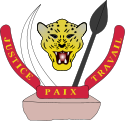- Constitution of the Democratic Republic of the Congo
-
Democratic Republic of the Congo 
This article is part of the series:
Politics and government of
the Democratic Republic of the Congo- Constitution
- President (List)
- Government
- Prime Minister (List)
- Parliament
- Political parties
- Elections
- Constitutional Court
- Court of Cassation
- Subdivisions
- MONUC
- Foreign relations
The Constitution of the Democratic Republic of the Congo is the basic law governing the Democratic Republic of the Congo. The Constitution has been changed and/or replaced several times since its independence in 1960.
Contents
Current Constitution
The Democratic Republic of the Congo is now under the regime of the constitution which was approved in a referendum by the Congolese people, and promulgated on February 18, 2006 by President Joseph Kabila. Wikisource contains the Complete Text of the Constitution (In the original French).
General provisions
New political subdivisions were brought by this constitution. The country is divided in 25 provinces, and the capital-city of Kinshasa - to take full-effect 36 months after the official installation of the newly elected President, which occurred on December 6, 2006.
See also
The new motto of the country is : « Justice, Peace, Work ».Political pluralism
Creating and belonging to a political party is a civil and political right for all Congolese people. Political parties must obey the law on political parties, respect public order and operate in accordance with "good mors". Parties receive subsidies from the government for their electoral campaign. Having a one-party-system is expressly unconstitutional.
Nationality and citizenship
Congolese citizenship is exclusive. Double citizenship is therefore impossible in theory. Anyone belonging to the ethnic groups whose persons and territory constituted what became Congo (currently the Democratic Republic of the Congo), at independence is a Congolese national.
Any Congolese national who has not lost his/her political rights, by virtue of a court decision, or by virtue of the law, is a Congolese citizen.
Rights and duties
Civil, political, economic, social, cultural and collective rights, as well as the duties of all citizens, are defined in Title III of the constitution - the unofficial bill of rights and duties. Title III also states that ignorance of the law is not a valid defense in court, or anywhere.
The new constitution limits marriage, in article 40, as the right to « marry the person of one's choice, of the opposite sex, and to create a family » ; thus, it forbids same sex marriage.
Executive power
Legislative power
Judiciary
Military and police
Past Constitutions
The country's first, provisional, constitution was the fundamental law of 1960, which was based on the Constitution of Belgium and established a parliamentary republic. A new constitution, dated August 1, 1964, strengthened the powers of the presidency, enhanced still further by the June 24, 1967 charter. This was amended in August 1974, revised on February 15, 1978, and amended on July 5, 1990. A transitional constitution was then promulgated in April 1994. A Constitutional Act was promulgated in May 1997; draft constitution was proposed but not finalized in March 1998. From April 2, 2003, the country was under a Transition Constitution, which was established as a result of the 2002 Global and Inclusive Agreement of Sun City, South Africa that ended the Second Congo War. This document was in effect until the current constitution came into force on February 18, 2006.
Constitution of Africa Sovereign
states- Algeria
- Angola
- Benin
- Botswana
- Burkina Faso
- Burundi
- Cameroon
- Cape Verde
- Central African Republic
- Chad
- Comoros
- Democratic Republic of the Congo
- Republic of the Congo
- Côte d'Ivoire (Ivory Coast)
- Djibouti
- Egypt
- Equatorial Guinea
- Eritrea
- Ethiopia
- Gabon
- The Gambia
- Ghana
- Guinea
- Guinea-Bissau
- Kenya
- Lesotho
- Liberia
- Libya
- Madagascar
- Malawi
- Mali
- Mauritania
- Mauritius
- Morocco
- Mozambique
- Namibia
- Niger
- Nigeria
- Rwanda
- São Tomé and Príncipe
- Senegal
- Seychelles
- Sierra Leone
- Somalia
- South Africa
- South Sudan
- Sudan
- Swaziland
- Tanzania
- Togo
- Tunisia
- Uganda
- Zambia
- Zimbabwe
States with limited
recognitionDependencies and
other territories- Canary Islands / Ceuta / Melilla / Plazas de soberanía (Spain)
- Madeira (Portugal)
- Mayotte / Réunion (France)
- Saint Helena / Ascension Island / Tristan da Cunha (United Kingdom)
- Western Sahara
 Democratic Republic of the Congo topics
Democratic Republic of the Congo topicsPolitics and law Constitution · Constitutional Court · Corruption · Court of Cassation · Elections · Flag · Foreign relations · Government · Human rights (LGBT rights) · Law enforcement · Military · National Assembly · Political parties · President · Prime Minister · SenateHistory Early history · Colonisation (1867–85) · Congo Free State (1885–1908) · Belgian Congo (1908–60) · Congo-Léopoldville (1960–65) · Congo Crisis (1960–65) · Zaire (1965–97) · First Congo War (1996–98) · Second Congo War (1998–2003) · 2000sGeography Economy and infrastructure Agriculture · Airports · Central Bank · Communications · Energy · Franc · Health · Mining · Resource extraction · TransportCulture and society Categories:- Democratic Republic of the Congo law
- Government of the Democratic Republic of the Congo
- Constitutions by country
Wikimedia Foundation. 2010.
